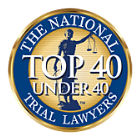5,000+
2,000+
5 Star
GBS & Vaccine Injuries
Weakness, numbness, or difficulty walking after a vaccine may be more than a passing reaction—it could be Guillain-Barré Syndrome.
Guillain-Barré Syndrome (GBS) is a rare but serious neurological condition that can develop after certain infections or, in fewer cases, after vaccines like the flu vaccine, influenza vaccination, or COVID-19 vaccine. It affects the peripheral nervous system, leading to muscle weakness, numbness, and in more severe cases, paralysis. Though the exact cause isn’t always known, studies suggest that immune response and a mechanism called molecular mimicry may play a role—where your immune system mistakenly targets peripheral nerve components instead of the virus.
While GBS is uncommon, the connection between certain vaccines and neurological symptoms like these has been noted in reported cases and systematic reviews. People experiencing these symptoms after a shot may not immediately connect the two. But recognizing the early signs, getting an accurate diagnosis, and beginning effective treatment quickly can improve recovery outcomes.
If you’re experiencing nerve symptoms after a recent vaccine, especially tingling, weakness, or trouble walking, we can help you explore whether it’s linked to GBS.

Awards and Associations
One of more of our attorneys have been recognized for the following:

Hear Cheryl's Vaccine Injury Story
Cheryl, a former client of My Vaccine Lawyer, shares her experience with Shoulder Injury Related to Vaccine Administration (SIRVA) following a flu shot. She describes the sudden onset of pain, limited shoulder mobility, and a long recovery process that led her to seek legal help from attorney Max Muller.
With his support, Cheryl filed a successful claim through the Vaccine Injury Compensation Program and received a settlement covering her medical expenses, lost wages, and pain and suffering. SIRVA symptoms typically include sudden pain within 48 hours of vaccination, restricted range of motion, and discomfort that can last for weeks or months.
Guillain-Barré Syndrome and How Is It Connected to Vaccines?
Several vaccines—including those for influenza, COVID-19, and RSV—have been linked to GBS in small numbers of reported cases. While Guillain-Barré Syndrome is not officially listed on the Vaccine Injury Table, legal precedents exist for successful GBS-related claims under the Vaccine Injury Compensation Program. These are considered “off-table” cases, meaning medical proof of causation is required. If you’re experiencing new neurological symptoms after a vaccine, this section explains how GBS starts, how it progresses, and what recovery can look like.
What Is Guillain-Barré Syndrome?
Guillain-Barré Syndrome (GBS) is a rare condition where your immune system starts attacking your nerves. It usually happens after an infection—like the flu, COVID, or a stomach virus—but it’s also been linked to some vaccines, including the flu vaccine, COVID-19 vaccination, and other shots.
When your body mistakes parts of your nerves for harmful viruses, it causes swelling and damage. That slows down your ability to send messages between your brain and your muscles—causing weakness, numbness, or even paralysis. This is called molecular mimicry. There are different forms of GBS, but they all affect how well your body moves and responds.
What Are the Symptoms of GBS?
GBS often starts in the legs, with tingling, burning, or weakness. Within days, that weakness can spread to your arms or face. Some people find they suddenly can’t grip things, walk without help, or even smile properly. In serious cases, GBS affects breathing or swallowing. Doctors look for signs like a loss of reflexes, difficulty standing, or muscle weakness that worsens quickly. These are called neurological symptoms, and they should always be taken seriously—especially if they begin within a few weeks of vaccination.
How Is GBS Diagnosed?
GBS is diagnosed based on how the symptoms appear and how quickly they develop. Doctors will often check how well your nerves are working using electrical tests (called nerve conduction studies), and they may take a sample of spinal fluid through a small procedure in your lower back. This helps them rule out infections or other causes. Because GBS is rare and hard to recognize early, diagnosis takes time. But catching it early is key to getting the right treatment and preventing it from getting worse as well as being the first steps to your GBS lawsuit.
What’s the Outlook If You’re Diagnosed with GBS?
Most people who get GBS do recover, but the process can take weeks or even months. Treatment often involves a medication called intravenous immunoglobulin (IVIG), which helps stop the immune system from doing more damage. Some people also need physical therapy to regain movement and strength.
For many, the weakness fades slowly with time. But for others, GBS leaves lasting effects like tiredness, pain, or trouble walking. That’s why early treatment, close monitoring, and support are so important—especially for people who developed symptoms after a vaccine.
If you’ve been diagnosed with Guillain-Barré or are still searching for answers after a vaccine, My Vaccine Lawyer will help you understand your options and whether you qualify for legal support.
We are the Highest Rated Vaccine Injury Law Firm in the Country!
SEE OUR NOTABLE SETTLEMENTS
See some of our vaccine injury settlements in the VICP.
See Vaccine Settlements Here
MEET MAX
Max is a founding Partner of My Vaccine Lawyer and has been a Super Lawyer for 11 years straight.
Meet Max
MEET PAUL
Paul is a founding Partner at My Vaccine Lawyer and has been featured in the Washington Post and CBS News for his accomplishments.
Meet Paul
What GBS Recovery Really Looks Like—and Why Legal Help Matters
Recovery from Guillain-Barré Syndrome is slow, expensive, and different for everyone. Some spend weeks in the hospital. Others face months of rehab, physical therapy, and weakness that makes basic tasks impossible. Treatment like IVIG can cost over $10,000 per round, with therapy adding thousands more. Add lost income, mobility issues, and uncertainty—and the impact is overwhelming.
If GBS followed a flu shot, COVID-19 vaccine, or influenza vaccination, you may qualify for compensation—even though it’s not listed on the Vaccine Injury Table. These “off-table” claims through the Vaccine Injury Compensation Program require strong documentation—but they’ve been won before. We can help you build that case.
Do You Qualify for Legal Support After a Vaccine-Related GBS Diagnosis?
Even though Guillain-Barré Syndrome isn’t officially listed on the Vaccine Injury Table, successful claims have been made under the Vaccine Injury Compensation Program (VICP) for people who developed GBS after vaccines like the influenza vaccine, COVID-19 vaccine, and seasonal flu vaccination. These cases require proof through medical records, case reports, and timelines that connect symptoms to the vaccination dose—usually a first vaccination dose.
If you're a medicare beneficiary, concerned about coverage, or unsure what steps to take, we can help. We’ve worked with patients recovering from vaccine associated GBS, and we understand the burden—not just physically, but financially and emotionally. Our role is to make sure your case is supported by clear evidence, meets VICP requirements, and reflects the real impact this condition has had on your life.
If Guillain-Barré symptoms started after your vaccine, My Vaccine Lawyer will help you prove the connection, build your case, and fight for the compensation you deserve.
Speak With A Lawyer Now!
Get a Free Consultation & See What Your Claim Is Worth
Have your case evaluated directly from one of our vaccine lawyers.
The Legal Process for Vaccine Injury Cases
Vaccine injury cases follow a unique legal process. Since these claims are handled under the VICP, they require an attorney with experience in federal vaccine litigation. At My Vaccine Lawyer, we start with a free consultation to assess your claim. We then gather medical records, expert testimony, and supporting evidence to build a strong case. If a fair settlement isn’t offered, we are prepared to take your case to trial.
1. Contact Your Doctor
If you suffered a vaccine-related injury, adverse effects or worsening symptoms, call your doctor immediately.
Still Have Questions?
-
What types of Guillain-Barré Syndrome are there?
GBS isn’t just one condition. There are several GBS subtypes and clinical subtypes, including acute motor, bilateral facial palsy, and acute inflammatory demyelinating polyneuropathy—the most common form in the U.S. Each subtype affects the nerves differently and may require different treatments.
-
How common is GBS after vaccination, really?
Though rare, GBS occurrence has been documented after most vaccines—especially the flu vaccine, COVID-19 vaccine, and Pfizer vaccine. According to epidemiologic evidence, it affects roughly 1–2 people per million doses, depending on the vaccine and patient history. This is based on safety monitoring, disease control, and data from the World Health Organization.
-
What raises the risk of developing GBS after a vaccine?
Having antecedent infections, such as respiratory or gastrointestinal illness, increases your baseline risk. Some patients may face increased risk due to genetic factors, contaminated proteins, or their response to MRNA vaccines and other vaccines. These factors are still being explored in clinical trials and further research.
-
What are the early signs I should not ignore?
Common initial symptoms include tingling, weakness in the legs, and sometimes bilateral facial weakness or numbness in the hands. These early GBS symptoms appear within days or weeks of vaccination. Delays in reporting can make it harder for healthcare professionals to confirm and treat the condition quickly.
-
Can fear of GBS lead to vaccine hesitancy?
Yes—and it’s understandable. But while neurological complications like GBS are real, they remain rare compared to the risks posed by the infectious diseases these vaccines protect against. Adverse events are tracked through international safety monitoring, and transparency from public health agencies helps maintain balance between vaccine hesitancy and informed decision-making.
Recent Blogs
How Long Do Flu Shot Side Effects Last?
Paul Brazil: Jan 22, 2026
What is the NCVIA?
Paul Brazil: Nov 10, 2025
Frozen Shoulder After Vaccine
Max Muller: Nov 5, 2025